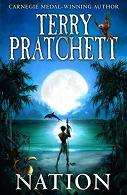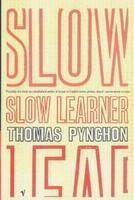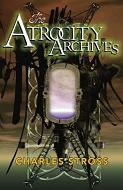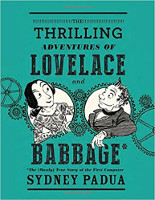 Nation is a stand-alone novel by Terry Pratchett, written, I presume, for Young Adults market, but just as enjoyable for any adult young at heart.
Nation is a stand-alone novel by Terry Pratchett, written, I presume, for Young Adults market, but just as enjoyable for any adult young at heart.
Mau is on his way back from the Island of Boys. He will receive his tattoos, his soul, and be a man when he returns to the Nation on the main island. But on the way back a huge wall of water overtakes his canoe (can you spell Tsunami?) and when he reaches the island he finds everybody dead, the village destroyed – he is all that remains of the proud Nation. And don't get me wrong – the Nation is old, very old. With its own creation myth and pantheon of gods; and with old myths, including the story of the sailors who sailed so far that they came home again.
Daphne (real name: Ermintrude. But don't tell anyone, she hates it) is on her way to join her father, who is Governor of the Crown in Port Mercia. And, as his domineering mothers likes to point out, only 139th in line to the throne. But her ship, the Sweet Judy, is caught up in the same wave, and is shipwrecked on the Nation. Everybody on board is dead – Daphne survives by having wrapped herself in her mattress, which was not really an option for the sailors.
Meanwhile back in London the Black Death, sorry, Russian Influenza is raging, and hitting of all classes alike. The King is dead, and so are loads of other people. Daphne's father is now King, or would be once he's found and crowned by the secretive servants of the crown (not the King – mark that distinction) - he needs to return to England within 6 months for that purpose – his Nation is in peril!
I'm not going to give away more of the story – in some regards this is a very standard setup for a classic adventure story and coming-of-age shenanigans for the two main characters (although Pratchett neatly side-steps a lot of the, er, squishy stuff). On the other hand there is much more going on, there is always a story bubbling away in parallel – going inwards (in a spiritual way, usually for Mau), or a story from the life story of Daphne (mainly), and a story of the world and its history, where Mau's ancient Nation - and Daphne's English Empire that makes map-makers run out of red ink - cross paths in interesting ways.
The book is written in the 3rd person, and follows the two main protagonists for most of it. There are no obvious, direct parallels, instead there are lots of little things that are somehow linked by different or even complementary set-ups, arranged in triangles and chains, with frequently very clever structures (think of the chain Mau-Nation-English Nation-Daphne's Father–Daphne-Mau outlined above). Generally Pratchett doesn't rub your nose in the similes and little devices, either – most of these things are quite subtly done, and are there for the reader to discover (and I don't think the story suffers if you miss some of them – actually, I'm quite sure I didn't catch all of them, either).
There is, as one would expect from Terry Pratchett, a good dollop of his trademark humour in the book, and some really great one-liners, too. The story in engaging and interesting, even if the book didn't catch me as much as some others by the same author did before. Especially some of the interactions stemming from the coming-of-age setup were rather toe-curling, but that might just be me, or the subject matter in general ...
My main point of complaint is something else - people hearing voices throughout the story. Now, there's nothing wrong this per se, Mau is allowed to hear the voices of the 'Grandfathers' (preserved elders & heroes in cave up the hill), or of Locaha (the local Death deity); and Daphne is allowed to hear her own voice (parallel existence? 2nd / 3rd thoughts?), but this is done so inconsistently that it hurts. If the story demands it they hear someone/something (the what/who is changing), if not then not. As a plot vehicle it is being overused, and in a very inconsistent way on top of that. In my eyes it is simply lazy plotting, and I'm sure this is something that, especially by someone of Sir Terry's calibre, could have been handled much more subtly and consistently.
I found this annoying, but besides this I found the book entertaining, overall well written, and clearly still a very recommended read.
Oh, and it contains one of the best explanations of the EWG parallel-world theories I've ever seen (this is from a very minor side thread in the story, and mainly concerns Mau's spiritual development), in a discussion between Mau and Locaha:
'There are not second chances – there are no chances at all. There is only what happens.'
'And what does not happen?' said Mau.
'That? That happens, too, somewhere else. Everything that can happen must happen, and everything that can happen must have a world to happen in.'
Do you have a simpler and clearer way of putting it?
Title: Nation
Author: Terry Pratchett
Reviewer: Markus
Reviewer URL: http://skating.thierstein.net
Publisher: Doubleday/Random House
Publisher URL: http://www.rbooks.co.uk
Publication Date: 2008
Review Date: 090318
ISBN: 9780385613705
Author URL: http://www.terrypratchett.co.uk
Pages: 404
Format: Hardback
Topic: Fantasy
Topic: Alternative History
More Terry Pratchett













